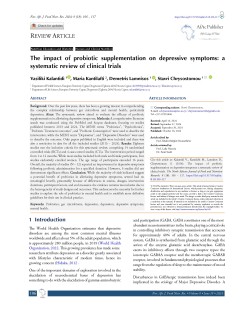Main Article Content
The impact of probiotic supplementation on depressive symptoms: a systematic review of clinical trials
Abstract
Background: Over the past few years, there has been an increasing emphasis on comprehending the complex relationship between gut microbiota and mental illnesses, particularly depression.
Aims: The objective of this present review was to determine the effectiveness of probiotic supplementation in alleviating depressive symptoms.
Methods: A comprehensive examination was conducted through an extensive search of the PubMed and Scopus databases, resulting in a systematic review of the available literature. The MESH terms "Probiotics", "Psychobiotics", "Probiotic Treatment outcomes", and "Probiotic Consumption" were used to describe the intervention, while the MESH terms "Depression", and "Depressive Disorders" were used to describe the outcome. Only papers published in English were included and there was also a restriction in date for all the included studies (2013-2024).
Results: Eighteen studies were eligible for inclusion in this systematic review, with 14 RCTs and 4 CTs. The intervention period ranged from 1 to 12 months. All studies incorporated both males and females, with the exception of four studies that exclusively enrolled women. In terms of age, studies involve people over 16 years of age. Overall, the majority of the studies (N=12) suggest an improvement in depressive symptoms after the administration of probiotics for a certain period of time while the remaining 6 studies did not show any significant effect.
Conclusion: While most of the trials indicated improvement, several had no meaningful benefit, presumably because of differences in strains, dosages, intervention durations, participant factors, and end measures. It is important to exercise caution before drawing definitive conclusions, as seen in prior research. This underscores the necessity for further studies to explore the role of probiotics in mental health.







